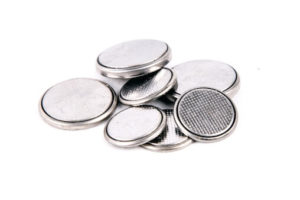Button Batteries
Large, powerful lithium coin cell battery – a thin button battery of a similar size to a 5 pence piece, can badly injure or kill a child if they are swallowed and get stuck in the throat or gullet, it can cause catastrophic internal bleeding and even death.

It is therefore important to keep easily accessible lithium coin cell batteries out of children’s reach, as well as spare and even ‘flat’ batteries, and to act fast if you think your child may have swallowed one.
Why are button batteries dangerous?
Button batteries are small, round, silver-coloured batteries that come in many different sizes and types. They power many of our devices at home to make our lives more convenient.
Most button batteries if swallowed should pass through the body without a problem. But if a lithium coin cell battery gets stuck in the food pipe, energy from the battery reacts with saliva to create caustic soda. This is the same chemical used to unblock drains!
This can burn through the food pipe, to the main artery and lead to catastrophic internal bleeding and death. The chemical reaction can happen in as little as two hours. However, sometimes it takes days or even weeks.
Lithium coin cell batteries can also cause life-changing injuries. There is a risk that the food pipe is too badly damaged for a child to eat normally again or the vocal cords are too badly damaged for a child to speak normally again.
Any button battery is also dangerous if it gets stuck in a child’s nose or ear.
The size and power of the button battery and the size of the child matter.
Lithium button batteries (often called ‘coin batteries’ or ‘coin cell batteries’) are more powerful than other button batteries and many are also bigger. With a large, powerful lithium coin cell battery – for example a 3V CR2025, CR2032, CR2330 or CR3032 – and a small child, the risks are greatest.
It’s not just fully charged lithium coin cell batteries that pose a risk to children.
Modern devices need a lot of power. When power levels drop, we think the battery is flat and discard it. But it can still have enough electrical charge left to badly injure a child.
Who is at risk?
Children are most at risk from 1 to 4 years, but younger and older children can also be at risk.
Crawling babies up to pre-schoolers are at particular risk as they explore the world by putting things in their mouths. Toddlers are naturally inquisitive and can be very determined to explore and get into things.
Older children can be fascinated by them too. In some cases, they may deliberately put one of these batteries in their mouth or on their tongue to experience the sensation of the electrical charge.
At least two children a year have died as a result of swallowing lithium coin cell batteries in the UK.
Surgeons at Great Ormond Street Hospital are seeing one child a month with corrosive burns caused by button batteries. It is not known how many children across the UK are taken to A&E, admitted to hospital or suffer life-changing injuries from button batteries.












